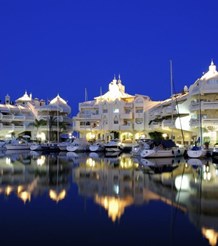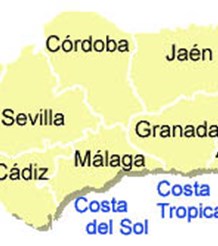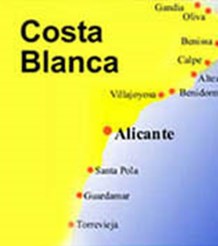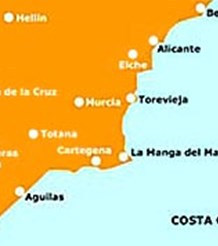
Spanish Property Area Guide
Wherever you are in Spain there is always something different to do or see. To live in large, modern cities like Madrid and Barcelona with their hustle and bustle is very different from living in a small fishing village. If you want something quieter and more restful than the large cities, there are thousands small fishing villages you can choose to live in. However, if you decide to move to a particular area, or purchase a property, it is important to know something about the vicinity.
Climate & Natural Factors
- Many northern Europeans dream of a “better” lifestyle. They have become disillusioned with the cold climate as well as their unhealthy, unsafe and hectic daily life.
- The rate of violent crime is much lower than in some northern European countries and Spanish family values and culture represent a good environment in which to bring up a family or indeed, retire.
- Spain, particularly southern Spain, offers a fantastic, year-round warm climate. Spain boasts some stunning beaches and breathtaking countryside which caters for all tastes. Rambling, golf, skiing, watersports and beach life are but a few of the ways in which residents and tourists enjoy the outdoors.
- An excellent infrastructure is already well established in Spain, including European standards in medical and social security services, making a move here “home from home”.
- Spain is easily accessible from the UK, with links to countless regional airports. Budget air fares abound and within 2 ½ hours you can be touching down in sunny Spain. Alternatively, if you need to dash back home, it will not be a lengthy logistical exercise to get there.
Spanish Cuisine
Spanish cooking is a direct result of its previous ancestry, making it reliant on anything from root vegetables and garlic, fruit and spices to grains, seafood, game and olive oil. Early settlers to Spain include the Iberians, Greeks, Phoenicians, Celts, Carthaginians and later the Romans. In the 8th Century AD, the Moslems (Moors) conquered the nation bringing the Moslem religion and culture with them. They ruled until the 13th Century when the Christians again took over.
Mediterranean Spain is known for the Catalan language and its fertile farmland that is perfect for cultivating fresh fruit and vegetables. The azure coastline stretching from Barcelona to Cartagena is ideal for fishing.
Andalusia, in southern Spain, is most famous for its gazpacho (cold tomato-based vegetable soup) that was created to cool off the workers in the hot, dry sun. Inland, Rioja wines are produced which are amongst the world's finest. However today, with the great influx of foreign visitors to the area, availability has greatly increased for all types of European and international food.
The Spanish, like many Latin cultures, make the mid-day meal their biggest, often stretching it out for hours. Work places shut down at 2pm and after a long, leisurely lunch and often a siesta (nap), they return to work at around 4.30 pm and work until late evening.
- Saffron - Spain is the world´s leading producer of saffron. It is made mainly in La Mancha, a region just south of Madrid. Saffron is a unique spice made from flower stigmas. Each flower yields three stigmas and one ounce of saffron needs an overwhelming 14,000 hand-picked stigmas! This accounts for the high price of saffron, although it is widely available throughout Spain and cheaper than elsewhere. Saffron adds a golden glow and a subtle flavour to foods so remember to appreciate the hard work involved when you next savour saffron.
- Sherry - Sherry is derived from the town of Jerez in Andalusia, where it originates. This fortified wine is drunk as an aperitif, with tapas, or after dinner. There are various different types of sherry produced: Fino sherries are light, dry and best when drunk chilled, while Amontillados are sweeter and drunk at room temperature. The most famous fino sherry is “Tio Pepe” from the Gonzalez Byass vineyards - their traditional enormous placards are often seen on the side of the road. Interestingly, these have been declared national monuments.
- Cava - Cava is Spain's term for sparkling wine and it is widely drunk in place of champagne. In the UK and USA many people know the Freixenet label. Another cava worth trying is Paul Cheneau Blanc de Blancs, with its clean crisp and complex flavours.
- Cured Hams - Spanish jamón Serrano is a Spanish institution and most Spaniards consider it to be the best of Spanish food. In Andalucia, the native breed of pig is a small black pig known as the “Iberico”. Thriving on acorns, it is famous for its superb flavour.
- Olive Oil - Andalucia is the world´s number one producer of olive oil and it is natural that it should form the main part of Spanish cooking. The Spanish people eat it drizzled onto toast with their morning coffee.
- Black and green olives - These are grown on the same tree. Green olives are simply unripe black olives and are picked in October. Remaining olives ripen and turn black, ready for picking in January or February. In Spain black olives are hardly ever eaten, being used mostly for making oil. Green olives are harvested for eating as tapas or for use as cooking ingredients.
Healthcare in Spain
Hospitals
Hospitals are well managed and of a high standard especially in the popular tourist areas and the big cities. However standards vary across the country with public medicine being scant in many of the inland areas of low population. This is a point to consider when looking for somewhere to live especially if you or your children or elderly relatives have ongoing medical conditions that might need emergency treatment.
Another point to consider is that Spain takes a different view to rehabilitation, convalescence and terminal illness, leaving care in these cases usually to the relatives. There are very few public nursing or retirement homes and even fewer hospices and convalescence homes.
Social Security
If you pay social security, healthcare in Spain is free or low cost, (families and retired people are also included). Like many countries however, the health service in Spain has waiting lists to see specialists and for non-urgent operations.
Visitors to Spain and foreign residents are able to use the Spanish National Health system, alongside Spanish nationals. However, there are many situations where the only alternative is private healthcare. There are ample companies offering this service in Spain. You pay a subscription and in return you are entitled to certain free and/or reduced price services.
Most of the hospitals in the tourist areas have volunteer translation services. However if you do not speak Spanish, then it is advisable to take someone who does speak Spanish with you to all appointments.
EU Nationals
Nationals of EU countries can get free medical treatment in Spain on production of the relevant paperwork (Form E-111 for British people), although for holiday-makers, private insurance is highly recommended. Spain has a very good national health service that works alongside an excellent private sector.
If you decide to take up permanent residence then you must have an E-121 form.
When attending a hospital (except in the case of an emergency) you must present either a social security card, or an E111 or E121, evidence of private health insurance or proof of ability to pay the bills. If the insurance company does not pay the hospital directly then you should pay yourself (credit cards are generally accepted) and claim this from the insurance company at a later date.
Vaccinations
No vaccinations are required for Spain, but if you plan on visiting North Africa , typhoid and polio boosters are highly recommended. The worst that is likely to happen to you is that you might fall victim to an upset stomach. To be safe, wash fruit and avoid tapas dishes that look as if they were cooked last week.
Spanish Doctors
The system of educating doctors is Spain is the same as in Europe. Medical doctors receive their training as university undergraduates. In the social security system, you will usually be assigned a general doctor where you live.
With insurance, you will be able to select a primary care doctor from those affiliated with your plan. There are a number of doctors in Spain who speak English, especially in cities and resort areas, including doctors who received their training in English speaking countries. Embassies and consulates usually have lists of these doctors.
Chemists
For minor complaints go to a farmacia- they're listed in the phone book in major towns and you'll find one in virtually every village - marked with a big green cross. Pharmacists are highly trained, willing to give advice (often in English), and able to dispense many drugs which would be available only on prescription in most other countries. They keep usual shop hours (9am. - 1.30 pm. and 5.30 – 8 pm.), but some open late and at weekends while a rota system keeps at least one open 24 hours. These are known as Farmacias de guardia.
If you have special medical or dietary requirements, it is advisable to carry a letter from your doctor, translated into Spanish, indicating the nature of your condition and necessary treatments.
Dentists
There are many dental practices in Spain but they are private and, while they are cheaper than in the UK, they have to be paid for. Dental service is good and you can easily find a dentist who speaks your language, especially in the more commercial resorts.
Health Factors Associated with Spain
The Eastern Mediterranean areas of Spain are among the healthiest places in the world to live, a fact endorsed by the World Health Organisation. Spain has a number of different climates with the damp and misty north and the hot arid south being the most extreme.
Rheumatism and arthritis sufferers frequently note a huge improvement in their conditions and an increase in mobility after moving to Spain.
People who suffer from stress often note a marked improvement as the pace of life is slower than in many European countries and the change in lifestyle in a warm and sunny climate generally makes people happier, less prone to ailments and with boosted immune systems.
THE NUMBER TO CALL FOR MEDICAL EMERGENCIES IS 061.
Driving In Spain
Roads in Spain
Prime Minister Jose Luis Rodriguez Zapatero implemented a 15-year plan to pave the way for high-speed travel between the country's provincial capitals by road or rail without having to go through Madrid. The programme is targeted to give Spain one of the "most advanced" infrastructure networks in Europe and will in turn boost the domestic economy.
An objective of the plan is to ensure that 94% of the country will be within 30 kilometers of a highway.
A little more than a quarter of the funds are being spent on expanding the road network. The biggest improvements are expected in the regions of Teruel, Ciudad Real, Salamanca, Cuenca, Soria, Zamora and Cáceres. Due to improved roads, property investor interest has been increased in the country’s interior as well as new coastal regions and property prices have consequently been rising steadily.
Documentation and equipment needed
You should have a full driving licence which includes a photograph as the Spanish police no longer accept the old green licences.
If you are a resident, your EU licence is acceptable for up to three months, after which you should register it with the traffic police. Be warned, most insurance policies will only accept your licence as valid after it has been registered with the traffic police.
You should have the following in the car:
Your original full driving licence, NOT a photocopy, Vehicle registration document (V5). If the vehicle is not registered in your name, carry a letter from the registered owner giving you permission to drive. Motor insurance - third-party insurance is compulsory. A green card is not required but your insurer should be advised of your trip. A first-aid kit is advisable but not compulsory. Wearers must carry a spare pair of glasses in the car. It is compulsory to carry a replacement set of bulbs. Visibility vests are compulsory in Spain (and likely to become compulsory throughout the EU) if your car breaks down and you need to get out of the car. Every person who gets out of the car is required to wear one. Warning triangles are also compulsory.
Provided you hold a full UK licence and you are over 18 years of age, you may drive a car or motorcycle over 75cc
Motorcycle drivers and passengers must wear crash helmets.
Seat belts and car seats
Seat belts are compulsory for front and rear seats. Children under 150 cm in height must either have a car seat or a booster seat.
Animals are legally obliged to be restrained in the back, so that they cannot jump into the front.
Speed limits
Motorway 120 km/h Open Road 90-100 km/h Town 50 km/h
Drinking and driving
Alcohol % in blood is limited to 0.05 (less than the UK). With over 0.05 % you could face anything from a severe fine, withdrawal of your licence or even imprisonment.
Fines
On-the-spot fines are issued unless you are a resident and have funds in Spain. Ensure the officer collecting the fine issues an official receipt.
Lights
Dipped headlights should be used in poor daytime visibility. Motorcycles must use dipped headlights during the day at all times.
Fuel
All grades of unleaded petrol (sin plomo), diesel and LPG are available as well as lead substitute additive. Leaded fuel no longer exists, however it is permitted to carry petrol in a can.
Car transportation
It is relatively inexpensive to have you car shipped to Spain, so you can use your own car without incurring the cost and inconvenience of hiring. It is important to use a reputable company to transport your vehicle to Spain.
Crime & Police in Spain
Like anywhere, Spain suffers from its fair share of crime, but this is minimal in comparison to many other countries. Below you can find out about the security situation in Spain and what you should do if you become a victim of crime.
The crime rate in Spain is no higher than anywhere else in the world and, with the exception of major cities, most places are unusually safe. The latest crime figures indicate that the UK is far worse off than Spain when it comes to crime - particularly violent crime.
Andalusia is a particularly safe place to be, particularly regarding violent crime. However, petty theft, such as bag snatching is commonplace, particularly in tourist resorts and big cities. Most of this can be avoided with a little forethought - carry valuables under your clothes if possible and watch for people who get unnecessarily close to you at airports, at stations, on trains or buses or on the street. Never leave baggage unattended and avoid crushes. Also be cautious with people who come up to offer or ask you something for no good reason. This could be a ploy to distract you, especially as many petty thieves work in gangs.
Remember:
- Don't carry huge amounts of money with you if not essential
- Do not discuss your finances with anyone, especially strangers or in public places
- If you use a taxi, make sure it is a genuine, state managed taxi, clearly marked - agree on a price before you get in
- Never invite strangers into your home
What to do if you are a Victim of Petty Theft
If you do lose anything valuable, the first step is go the nearest Local Police station (as opposed to the Guardia Civil or National Police). They will then complete a form, which you sign, stating the facts. This is a vital document if you are planning to claim on your insurance policy. The police will take your contact details in the event they locate the stolen items. If you lose your passport, you will need to contact your embassy or consulate for a replacement.
Spanish Police
There are police stations in all cities and towns, where you can report incidents or ask for help. The national emergency telephone number for the Police is 091.
Apart from the Servicio de Vigiliancia Aduanera or the Policía Judicial, there are four other security bodies that you can contact:
- Guardia Civil : Their main civil duties are to control the traffic on the roads, urban patrol and the control of guns and explosives. This body is responsible to the Ministry of Defence and is also under military control. They can easily be recognised by their green uniforms.
- Policía Nacional : This is the security body responsible to the Ministry of the Interior. Their main responsibility is that of public safety, criminal investigation, narcotics, fraud, etc. They wear a dark blue uniform with a red and yellow badge of the Spanish flag.
- Policía Local : This is the organisation that operates within local areas and towns, their duties are mainly centered around road traffic and public disorder offences. Their uniform is very similar to that of the Policía Nacional, except without the red and yellow badge.
- Policía Autonómica : This a body dependent on the regional administration of Andalucía. It has less authority than the other bodies and is mainly concerned with the various legal aspects of the administration, its public buildings and the environment. These police wear the green and white badge of the Andalusian flag.
These are general definitions, as all four of the above bodies often operate together. Apart from these official bodies, there are also numerous security guards from private security companies, however their responsibilities are minimal and they are prohibited from carrying out police operations by law.
On the Costa del Sol, you have access to the European-wide emergency number: 112 . This toll-free number can be dialed in all kinds of emergencies, eg: security, health or other urgent matters. Spanish, English, French and German speaking personnel operate this 24-hour-service line. We recommend calling 112 for any kind of emergency.






